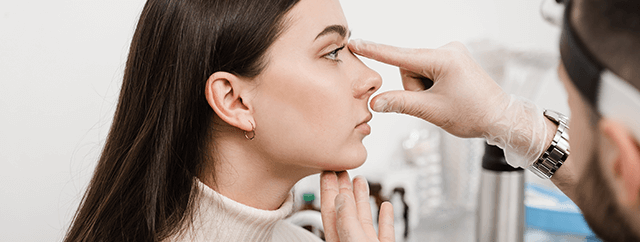Post Date: 8/9/2023

Deviated septum is a condition where the cartilage and bone structure within the nasal region, known as the septum, is shifted or curved in one direction. This condition can affect the airflow in the nasal passages and lead to breathing problems.
"What is a deviated septum?" Deviated septum is a common health issue in the ear, nose, and throat area. In individuals with this condition, the deviation of the nasal bone can block the nasal passage and disrupt normal nasal airways, causing nasal congestion. If you have this condition, your quality of life may be affected, and you may struggle with respiration through your nose, even experiencing difficulty breathing during sleep.
"How to fix a deviated septum?" is another frequently asked question. It is important for individuals with this problem to consult a specialized doctor (ear nose and throat) for accurate diagnosis and treatment. Issues like nasal obstruction and deviated nasal bone can be alleviated through personalized treatment approaches, enhancing individuals' quality of life. One of Turkey's leading experts in Rhinoplasty, Prof. Dr. Selçuk İnanlı, welcomes everyone who wants to avoid living with this discomfort at his clinic.
In the treatment of this problem, septoplasty surgery is one of the most commonly chosen practices. This is also the certain answer to "How to fix deviated septum?". This surgery aims to correct the deviated nasal bone. By correcting the nasal bone, the interior of the nose can be straightened, allowing for easier breathing. However, aside from surgical intervention, alternative methods such as medications containing nasal steroid and nasal spray can be used for deviated septum treatment.
Accurate diagnosis is crucial for the effectiveness of the operation. Ear, nose, and throat specialists assess patients' complaints to determine the most suitable treatment option. In some cases, surgery may not be necessary, and the patient's symptoms can be alleviated through simple methods like nasal strips. Individuals in need of septoplasty surgery may also experience sleep apnea. Therefore, the answer to the question "Can a deviated septum cause sleep apnea?" is yes.
Sleep apnea is a condition characterized by repeated and temporary cessation of breathing while you sleep. This occurs due to the obstruction or narrowing of the airway, leading to pauses in respiration. When it occurs frequently, it can result in decreased sleep quality, impacting your daily life negatively. It's one of the answers to the question "How do you know if i have a deviated septum?" There are three different types of sleep apnea.
The first type, Obstructive Sleep Apnea (OSA), is the most common. In this condition, when your throat muscles relax, it leads to the blockage or narrowing of the airway. This temporarily stops or makes breathing difficult during the night. As a result, you may experience symptoms like sleeplessness, daytime fatigue, and morning headaches.
Central Sleep Apnea Syndrome (CSAS) occurs when your respiratory muscles don't respond to brain signals. This also results in pauses in breathing, similar to obstructive apnea. It's rarer compared to obstructive apnea. There are cases where both types occur together. The underlying causes of this condition can vary, and septoplasty is among the treatment options.
Deviated nasal bone, medically referred to as septal deviation, can have various underlying causes and is often the result of combinations of factors. Below, you can find answers and explanations to the question "How to tell if you have a deviated septum?".
People with a deviated septum may have a deviated nasal bone due to anatomical structures present from birth. This could be linked to genetic factors or conditions that occurred during fetal development. Impact to the facial area or traumatic injuries can lead to changes in the cartilage and bone structure of the nose. Such damage can result in septal deviation. During the rapid growth and development of adolescence, irregularities can occur in the cartilage and bones of the nasal area, contributing to deviated nasal bone. These mostly correspond to "What causes a deviated septum?", when you ask your expert.
Natural changes occur in bones and cartilage as part of the aging process. These changes can also lead to the deviated nasal bone over time. Infections or inflammation within the nasal area can affect the tissues and contribute to deviation. Conditions like sinusitis, especially recurring infections, can play a role. Hormonal fluctuations, particularly during adolescence or pregnancy, can lead to specific anomalies and contribute to the deviated nasal bone. For those wondering "Do I have a deviated septum?", these factors can provide potential answers.
Before septoplasty surgery, you will have a detailed consultation with your doctor. Due to the sensitivity of the area, a thorough evaluation of the internal structures is essential. This is generally done through an endoscopic examination. Your medical history, including the use of blood-thinning medications, will also be taken into account.
Deviated septum surgery is usually performed under general anesthesia. While you are unconscious, the specialist will lift the mucosa to access the nasal septum. Necessary adjustments are then made to the cartilage and bone to bring them to their intended position. The improved septum is secured with internal stitches.
After the surgery, you will likely be kept under observation for a few hours. Once you return home, you should rest as recommended by your specialist, keep your head elevated while sleeping, take your prescribed medications regularly, and attend follow-up appointments in the coming days. If you're concerned about "Can a deviated septum come back after surgery?", here is the answer: Rest assured that unless significant trauma occurs, the deviation corrected by septoplasty does not recur.
One of the concerns might be "Can a deviated septum get worse?". If preventive measures are not taken in a timely manner, it is possible. However, you can address sleep-related complaints, snoring, and breathing issues all at once in a safe and comfortable manner. To enjoy the pleasure of respiration healthily, book an appointment with Prof. Dr. Selçuk İnanlı right away. You can easily reach us through our contact information.